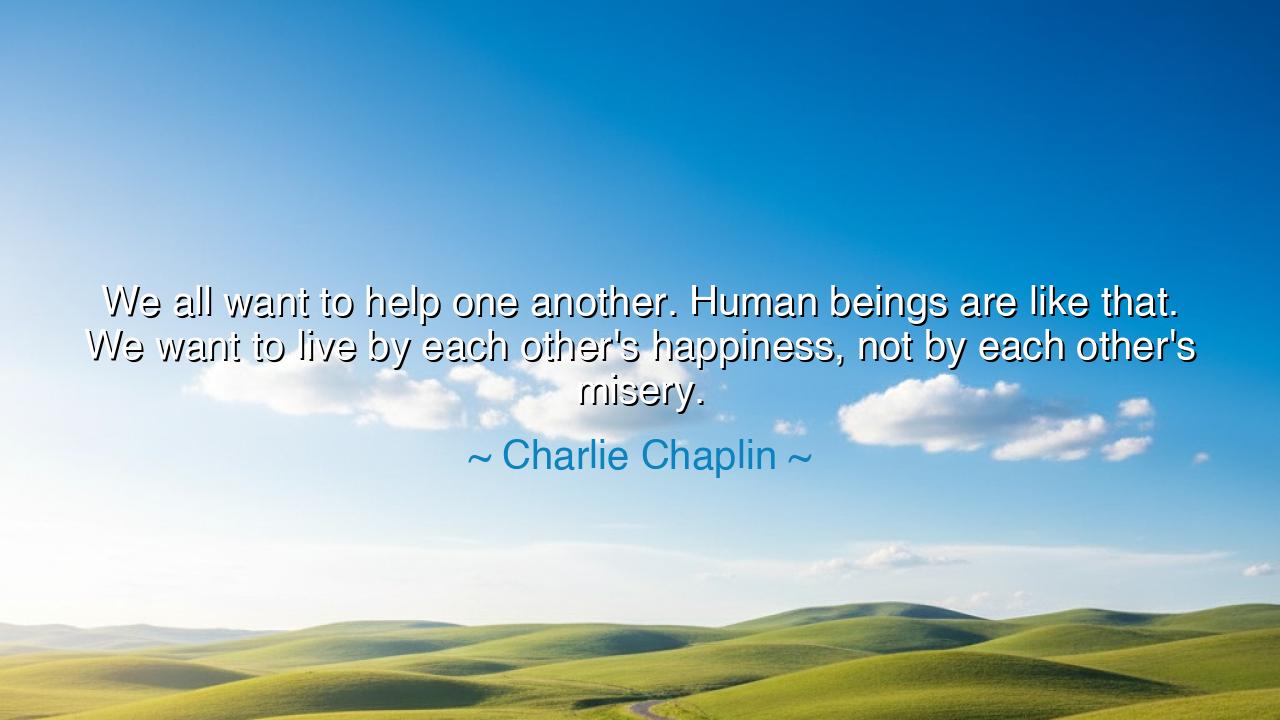
We all want to help one another. Human beings are like that. We
We all want to help one another. Human beings are like that. We want to live by each other's happiness, not by each other's misery.






“We all want to help one another. Human beings are like that. We want to live by each other's happiness, not by each other's misery.” Thus spoke Charlie Chaplin, not merely as an actor cloaked in comedy, but as a sage draped in compassion. In these words — drawn from the closing speech of his 1940 film The Great Dictator — he gave voice to the universal cry of the human heart: that beneath our fears, divisions, and masks, we are bound together by our longing to love and to be loved. His message, delivered at the brink of a world at war, is not just a plea for peace but a revelation of human nature — that goodness, not cruelty, is our truest inheritance.
The meaning of Chaplin’s words is both simple and eternal. He reminds us that the essence of humanity is not competition, but cooperation; not hatred, but fellowship. Though nations rise and fall, though greed and violence stain our history, there remains within each person an indestructible impulse to help, to protect, to comfort. This is the quiet courage of the heart that seeks unity over conquest. To “live by each other’s happiness” is to recognize that our joy is not separate — that one person’s suffering diminishes the whole, and one person’s joy lifts the world. Chaplin teaches that our true strength lies not in power, but in kindness, not in domination, but in empathy.
The origin of this quote lies in one of the most powerful moments in film history. In The Great Dictator, Chaplin, who had long been known as the silent Tramp, finally speaks — and his words pierce deeper than any performance of his career. The film was released during the shadow of World War II, when tyranny and hatred swept across continents. Chaplin, risking condemnation and censorship, dared to use his art to cry out against fascism, intolerance, and the blind cruelty of man against man. His character, a humble barber mistaken for a dictator, stands before the world and delivers a plea for human unity. “We all want to help one another,” he declares, as if tearing away the illusions of fear to reveal the heart’s enduring truth.
History itself has proven Chaplin’s insight. Consider the Berlin Airlift of 1948, when, after years of war and division, former enemies — the United States and its allies — risked all to save the people of Berlin from starvation. Pilots flew through perilous skies, bringing food and fuel to those trapped behind the Iron Curtain. They did so not for glory, nor for profit, but out of the simple conviction that human beings are like that — that to see another suffer is to feel one’s own humanity wounded. Even amid the rubble of destruction, compassion endured. It is this spirit — the spirit Chaplin called forth — that rebuilds civilizations when war has burned them to ash.
Chaplin’s words also reveal a timeless paradox: that the world teaches us to compete, to dominate, to hoard — yet the soul finds peace only in giving. The man who seeks happiness through the misery of others becomes hollow, restless, and afraid. But the one who serves, who uplifts, who shares — that person discovers the secret kingdom within: a heart free from fear. The happiness of others becomes his own reflection. This truth, spoken through Chaplin’s trembling voice, carries the wisdom of the ancients: that joy is multiplied when shared, and diminished when kept.
To live by this teaching requires courage, for it is not easy to love in a world that rewards selfishness. Yet every act of kindness — every smile, every helping hand — is a rebellion against despair. Begin where you are. Help one person today. Listen, forgive, give without expectation. These may seem small things, but together they form the unseen architecture of peace. When enough hearts act in love, the noise of hate will fade, and the world will remember what it was meant to be.
The lesson, then, is clear and immortal: we are one human family, woven from the same fabric of compassion. Our destinies are intertwined. When we live by each other’s happiness, we rise together; when we live by each other’s misery, we fall apart. Let Chaplin’s words echo not as mere sentiment, but as commandment: to help, to heal, to hope. For the greatness of humanity lies not in wealth or power, but in the quiet, stubborn goodness that endures through every age — the courage to love when it would be easier to hate, and to believe, even in dark times, that human beings are like that.






AAdministratorAdministrator
Welcome, honored guests. Please leave a comment, we will respond soon